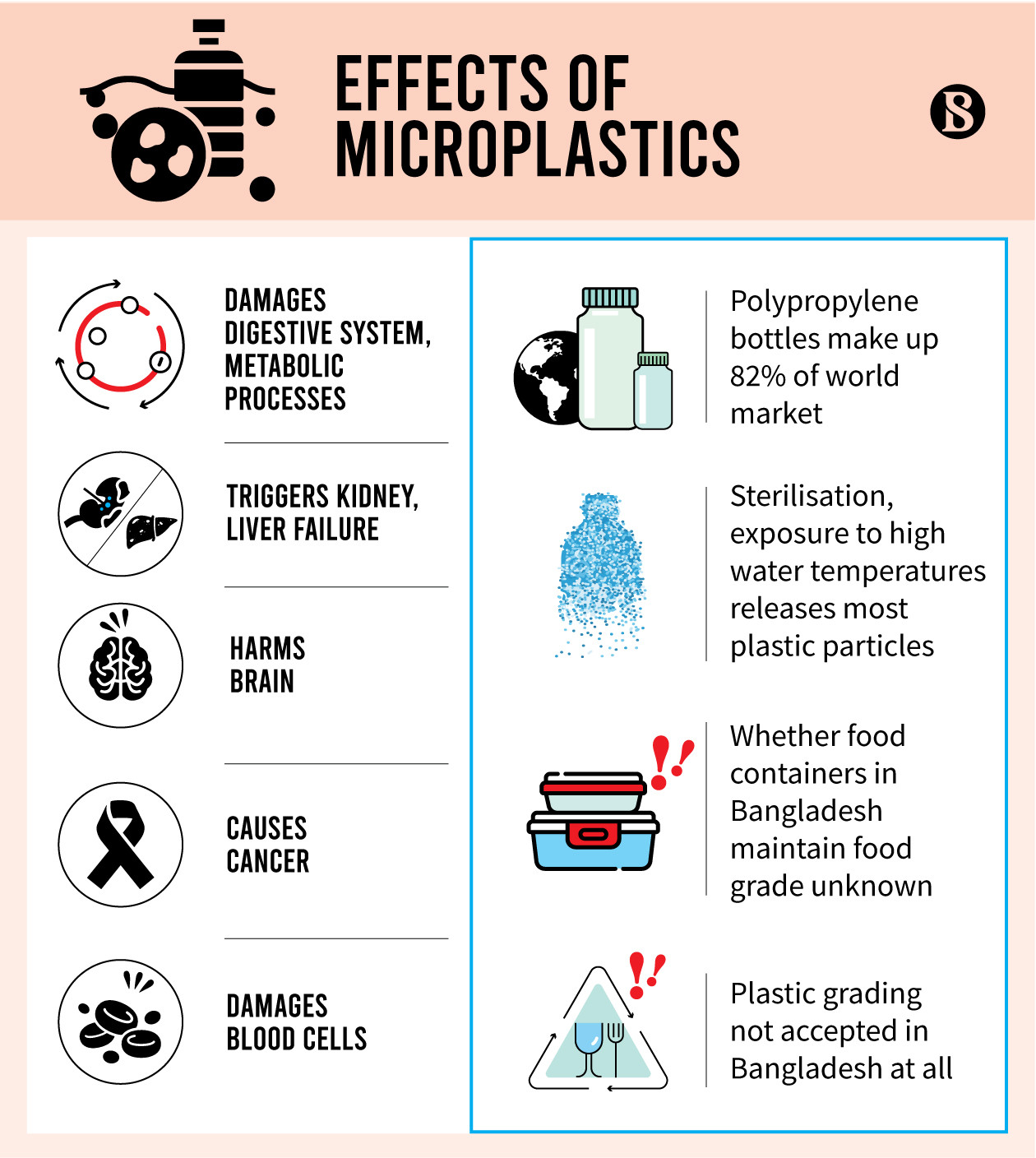Plastics fed to babies
It is still unknown whether food containers in Bangladesh maintain the food grade

Bottle-fed babies may ingest more than a million microplastic pieces each day, a new research said Monday, highlighting the abundance of plastics in our food products.
There is growing evidence that humans consume a large number of the tiny particles formed when larger pieces of plastic break down, but very little is known about their knock-on health consequences.
Microplastics are very small pieces of plastic that pollute the environment. They are not a specific kind of plastic, rather any type of plastic fragment that is less than 5 millimetres in length, according to the US National Oceanic and Atmospheric Administration (NOAA) and the European Chemicals Agency.
Researchers in Ireland looked at the rate of microplastic release in 10 types of baby bottles or accessories made from polypropylene, the most commonly used plastic for food containers.
They followed official guidelines from the World Health Organization on sterilisation and formula preparation conditions.
Over a 21-day test period, the team found that the bottles released between 1.3 million and 16.2 million plastic microparticles per litre.
They then used this data to model the potential global infant exposure to microplastics from bottle-feeding, based on national average rates of breast-feeding.
They estimated that an average bottle-fed baby could be ingesting 1.6 million plastic particles every day during the first 12 months of their lives.
Many Bangladeshi children are also fed in plastic bottles. Therefore, experts say, microplastics may affect our children, too.
Dr Lelin Chowdhury, an expert on preventive medicine, told The Business Standard that plastic has immediate and long-term effects on the human body as it is not ready for the digestive system.
When microplastics enter the body, it slowly damages its digestive system and metabolic processes. Kidney and liver failures occur gradually. Microplastic can cause cancer too, Lelin said.
All in all, plastics do as much damage in the macro form as they do in the micro form. Since children are sensitive, more damage will be done if microplastics enter their bodies, the expert explained.
According to a report published by The Guardian – a British daily, the polypropylene bottles tested make up 82% of the world market, with glass bottles being the main alternative.
Polypropylene is one of the most commonly used plastics, and preliminary tests by the scientists found kettles and food containers also produce millions of microplastics per litre of liquid.
Dr Lelin Chowdhury said, "We always say it is safe to keep water or milk in glass bottles. Because glass does not react with what is kept in a glass container."
The authors of the research, published in the Nature Food journal, said sterilisation and exposure to high water temperatures had the biggest effect on microplastic release, going from 0.6 million particles per litre on average at 25 degrees Celsius to 55 million per litre at 95 degrees Celsius.
The authors told France-based news agency AFP that the aim of the research was "not to worry parents" about the potential health risks of bottle microplastics.
"We have communicated, as strongly as we can, that we do not know the potential health risks of infant ingestions of microplastics," said the team, from Trinity College in Dublin.
"This is an area of research we are now actively pursuing," they also said.
Fay Couceiro, senior research fellow in Biogeochemistry, University of Portsmouth, said Monday's research highlighted the "urgency for studies on microplastic impacts on human health".
She said it was important not to be "alarmist" when it came to bottle feeding, which many parents prefer for a variety of reasons.
"The risks from not sterilising bottles or using hot water are well understood and very real, and these known risks of disease must outweigh that of microplastic production until their health risks are understood," said Couceiro, who was not involved in the study.
Professor Ijaz Hossain, environment expert and dean of engineering at the Bangladesh University of Engineering and Technology, said the direct impacts of microplastics are unknown.
The problem with microplastics is that it can be absorbed into the body. Microplastics can accumulate in the lungs. In many places the foreign body, anything unnecessary in the blood, can damage the cells if it moves. The cells can cause cancer and, if it goes to the brain, it can do damage, he also said.
"We should always try to prevent this kind of foreign body from entering the human body. Children's bodies are forming; and their formative age needs to protect them from such things as much as possible."
Do food containers in Bangladesh have food grade?
It is still unknown whether food containers in Bangladesh maintain the food grade.
"It has recently come to my notice that the plastic grading is not accepted in Bangladesh at all," said Dr Lelin.
Nilufa Haque, director (standards) of Bangladesh Standards Testing and Institution (BSTI), said the institute actually controls the quality of imported and locally-made baby food.
"We also control the quality of the products inside the containers. However, I do not know whether the containers' quality is controlled," she said.



 Keep updated, follow The Business Standard's Google news channel
Keep updated, follow The Business Standard's Google news channel
















